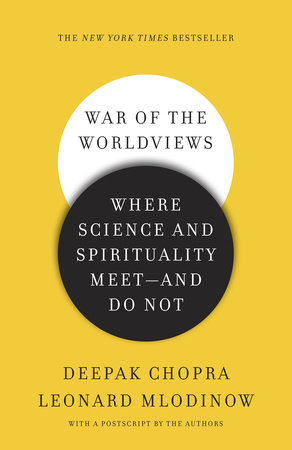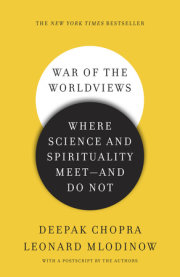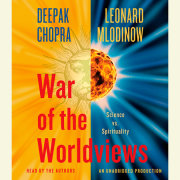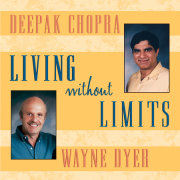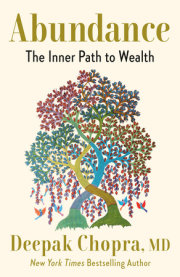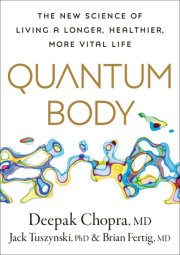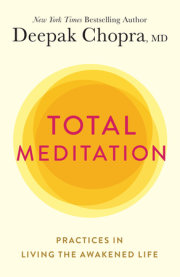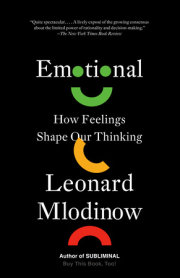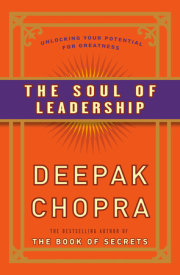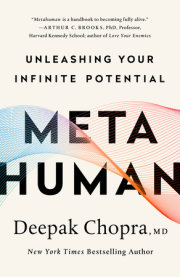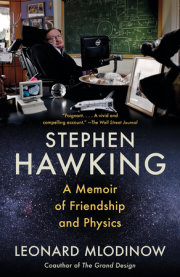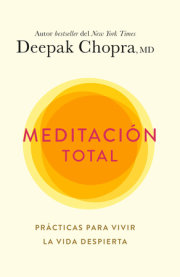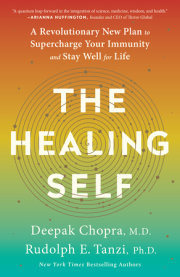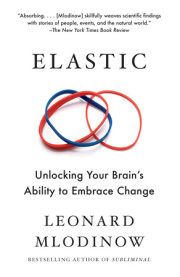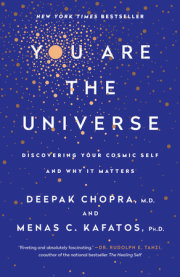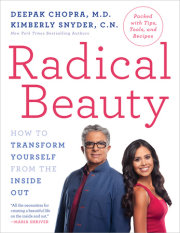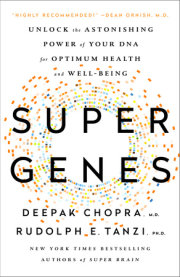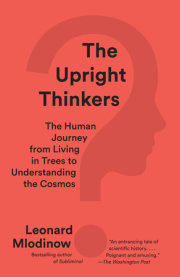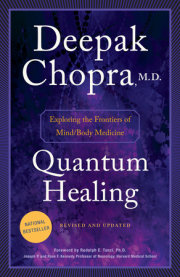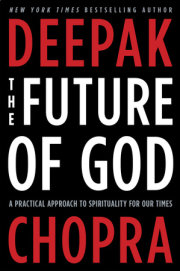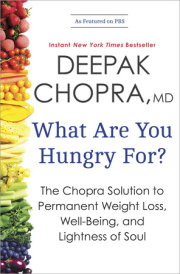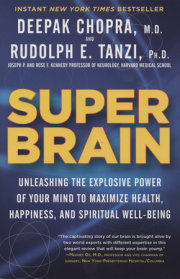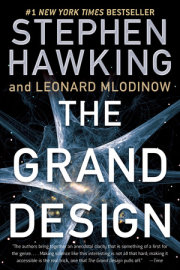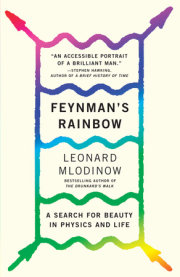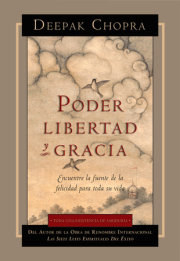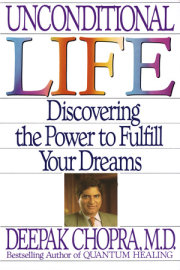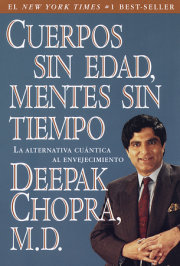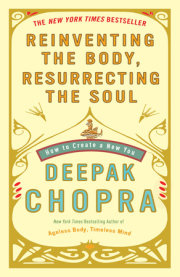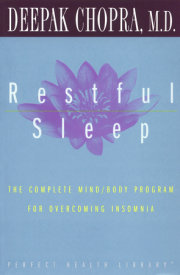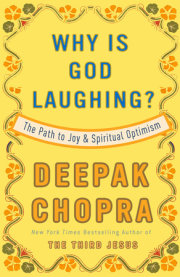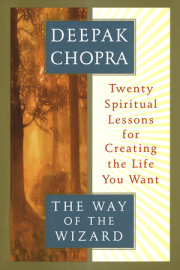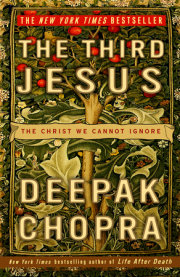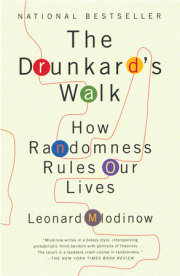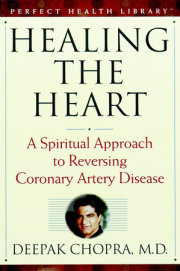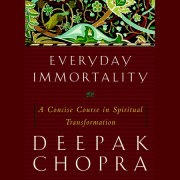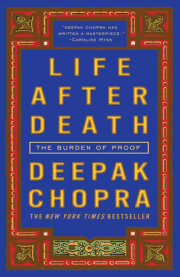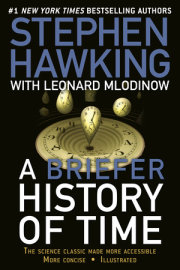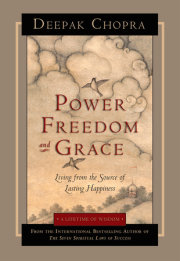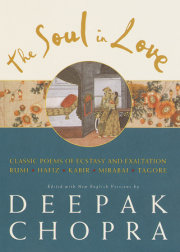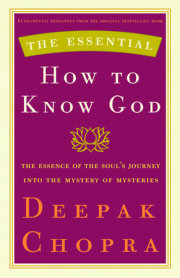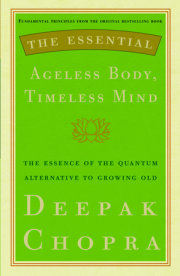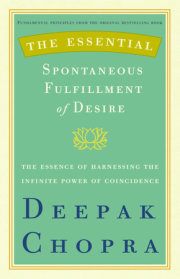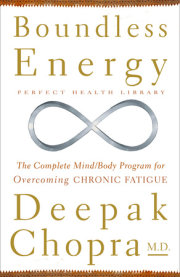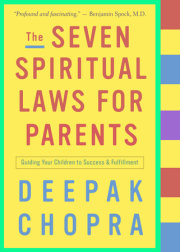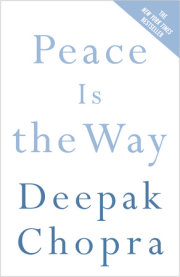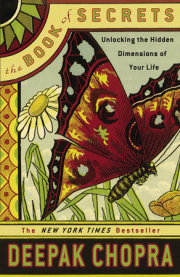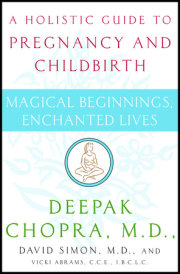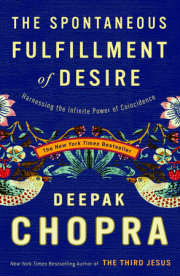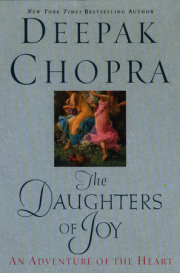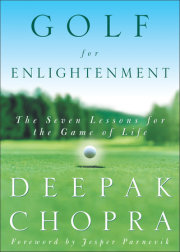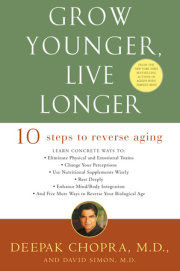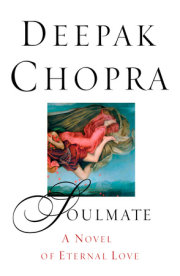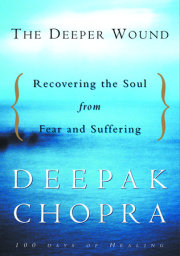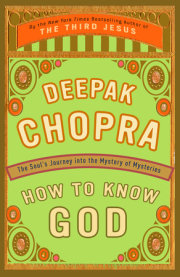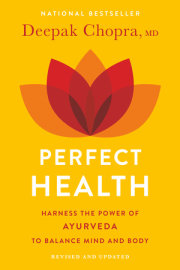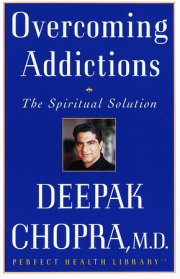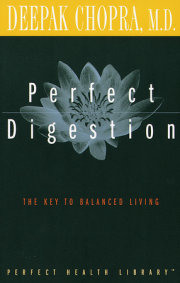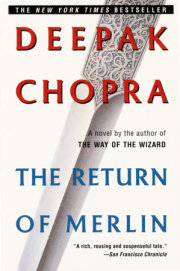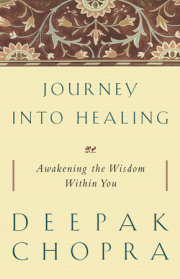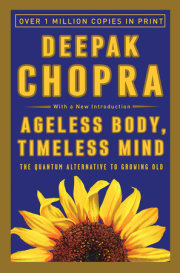Perspectives
The Spiritual Perspective
DEEPAK
Who looks outside, dreams; who looks within, awakens.
-Carl Jung
If it is going to win the struggle for the future, spirituality must first overcome a major disadvantage. In the popular imagination, science long ago discredited religion. Facts replaced faith. Superstition was gradually vanquished. That's why Darwin's explanation of man's descent from lower primates prevails over Genesis and why we look to the Big Bang as the source of the cosmos rather than to a creation myth populated by one or more gods.
So it's important to begin by saying that religion isn't the same as spirituality-far from it. Even God isn't the same as spirituality. Organized religion may have discredited itself, but spirituality has suffered no such defeat. Thousands of years ago, in cultures across the globe, inspired spiritual teachers such as the Buddha, Jesus, and Lao-tzu proposed profound views of life. They taught that a transcendent domain resides beyond the everyday world of pain and struggle. Although the eye beholds rocks, mountains, trees, and sky, this is only a veil drawn over a vast, mysterious, unseen reality. Beyond the reach of the five senses lies an invisible realm of infinite possibility, and the key to unfolding its potential is consciousness. Go within, the sages and seers declared, and you will find the true source of everything: your own awareness.
It was this tremendous promise that religion failed to deliver on. The reasons don't concern us here, because this is a book about the future. It's enough to say that if the kingdom of God is within, as Christ declared, if nirvana means freedom from all suffering, as the Buddha taught, and if knowledge of the cosmos is locked inside the human mind, as the ancient rishis, or sages, of India proposed, we cannot look around today and say that those teachings bore fruit. Increasingly few people worship in the old ways around the world, and even as their elders lament this decline, those who have walked away from religion no longer even need an excuse. Science long ago showed us a brave new world that requires no faith in an invisible realm.
The real issue is knowledge and how you attain it. Jesus and the Buddha had no doubt that they were describing reality from a position of true knowledge. After more than two thousand years, we think we know better.
Science celebrates its triumphs, which are many, and excuses its catastrophes, which are also numerous-and growing. The atomic bomb delivered us into an age of mass destruction that brings night terrors just to contemplate. The environment has been disastrously disrupted by emissions spewing from the machines that technology gives us to make life better. Yet supporters of science shrug off these threats as either side effects or failures of social policy. Morality, we are told, isn't the responsibility of science. But if you look deeper, science has run into the same problem as religion. Religion lost sight of humility before God, and science lost its sense of awe, increasingly seeing Nature as a force to be opposed and conquered, its secrets stripped bare for the benefit of humankind. Now we are paying the price. When asked if Homo sapiens is in danger of extinction, some scientists offer hope that within a few hundred years space travel will be advanced enough to let us abandon the planetary nest we are fouling. Off we go to spoil other worlds!
We all know what's at stake: the foreseeable future looms grimly over us. The standard solution for our present woes is all too familiar. Science will rescue us with new technology-for restoring the environment, replacing fossil fuels, curing AIDS and cancer, and ending the threat of famine. Name your malady and there's someone to tell you that a scientific solution is just around the corner. But isn't science promising to rescue us from itself? And why is that a promise we should trust? The worldview that triumphed over religion, which looks upon life as essentially materialistic, has set us on a path that leads to a dead end. Literally.
Even if we miraculously eliminated disastrous pollution and waste, coming generations will still have no model for the good life except the one that has failed us: endless consumption, exploitation of natural resources, and the diabolical creativity of warfare. As a young Chinese student bitterly commented about the West, "You ate the whole banquet. Now you give us coffee and dessert, but tell us to pay for the entire meal."
Religion cannot resolve this dilemma; it has had its chances already. But spirituality can. We need to go back to the source of religion. That source isn't God. It's consciousness. The great teachers who lived millennia ago offered something more radical than belief in a higher power. They offered a way of viewing reality that begins not with outside facts and a limited physical existence, but with inner wisdom and access to unbounded awareness. The irony is that Jesus, the Buddha, and the other enlightened sages were scientists, too. They had a way of uncovering knowledge that runs exactly parallel to modern science. First came a hypothesis, an idea that needed testing. Next came experimentation to see if the hypothesis was true. Finally came peer review, offering the new findings to other researchers and asking them to reproduce the same breakthrough.
The spiritual hypothesis that was put forward thousands of years ago has three parts:
1. There is an unseen reality that is the source of all visible things.
2. This unseen reality is knowable through our own awareness.
3. Intelligence, creativity, and organizing power are embedded in the cosmos.
This trio of ideas is like the Platonic values in Greek philosophy, which tell us that love, truth, order, and reason shape human existence from a higher reality. The difference is that even more ancient philosophies, with roots going back five thousand years, tell us that higher reality is with us right here and now.
In the following pages, as Leonard and I debate the great questions of human existence, my role is to offer spiritual answers-not as a priest or a practitioner of any particular faith, but as a researcher in consciousness. This runs the risk, I know, of alienating devout believers, the many millions of people in every faith for whom God is very personal. But the world's wisdom traditions did not exclude a personal God (to be candid, I was not taught as a child to worship one, but my mother did, praying at a temple to Rama every day of her life). At the same time, wisdom traditions all included an impersonal God who permeates every atom of the universe and every fiber of our being. This distinction bothers those believers who want to cling to the one and only true faith, whatever it may be for them. But an impersonal God doesn't need to be a threat.
Think of someone you love. Now think of love itself. The person you love puts a face on love, yet surely you know that love existed before this person was born and will survive after they pass away. In that simple example lies the difference between the personal and the impersonal God. As a believer you can put a face on God-that is a matter of your own private choice-but I hope you see that if God is everywhere, the divine qualities of love, mercy, compassion, justice, and all the other attributes ascribed to God extend infinitely throughout creation. Not surprisingly, this idea is a common thread in all major religions. Higher consciousness allowed the great sages, saints, and seers to attain a kind of knowledge that science feels threatened by but that is completely valid. Our common understanding of consciousness is too limited to do justice here.
If I asked you, "What are you conscious of right this minute?" you would probably start by describing the room you're in and the sights, sounds, and smells surrounding you. On reflection you'd become aware of your mood, the sensations in your body, perhaps a hidden worry or desire that lies deeper than superficial thoughts. But the inner journey can go much deeper, taking you to a reality that isn't about objects "out there" or feelings and thoughts "in here." Eventually those two worlds meld into one state of being that lies beyond the limits of space-time, in a realm of infinite possibilities.
Now we face a contradiction, however. How can two realities that are opposites (the way baking a loaf of bread is the opposite of dreaming about a loaf of bread) turn out to be the same? This improbable vision is succinctly described in the Isha Upanishad, an ancient Indian scripture. "That is complete, and this is also complete. This totality has been projected from that totality. When this wholeness merges in that wholeness, all that remains is wholeness." At first glance, this passage seems like a riddle, but it can be deciphered by realizing that "that" is the state of pure consciousness, while "this" is the visible universe. Both are complete in themselves, as we know from science, which has been satisfied for four centuries with exploring the visible universe. But in the spiritual worldview a hidden wholeness underlies all of creation, and ultimately it is this invisible wholeness that matters most.
Spirituality has been around for many thousand years, and its researchers were brilliant-the very Einsteins of consciousness. Anyone can reproduce and verify their results, as with the principles of science. More important, the future that spirituality promises-one of wisdom, freedom, and fulfillment-hasn't vanished as the age of faith declined. Reality is reality. There is only one, and it's permanent. This means that at some point the inner and outer worlds must meet; we won't have to choose between them. That in itself will be a revolutionary discovery, since the dispute between science and religion has persuaded almost everyone that either you face reality and deal with the tough questions of everyday life (science), or you passively retreat and contemplate a realm beyond everyday life (religion).
This either/or choice was forced on us when religion failed to deliver on its promises. But spirituality, the deeper source of religion, hasn't failed and is ready to meet science face-to-face, offering answers consistent with the most advanced scientific theories. Human consciousness created science, which ironically is now moving to exclude consciousness, its very creator! Surely this would leave us with worse than an orphaned and shrunken science-we'd inhabit an impoverished world.
It has already arrived. We live in a time of rude atheism, whose proponents deride religion as superstition, illusion, and a hoax. But their real target isn't religion; it's the inner journey. I am less concerned with attacks on God than I am with a far more insidious danger: the superstition of materialism. To scientific atheists, reality must be external; otherwise their whole approach falls apart. If the physical world is all that exists, science is right to mine it for data.
But here the superstition of materialism breaks down. Our five senses encourage us to accept that there are objects "out there," forests and rivers, atoms and quarks. However, at the frontiers of physics, where Nature becomes very small, matter breaks down and then vanishes. Here, the act of measuring changes what we see; every observer turns out to be woven into what he observes. This is the universe already known to spirituality, where passive observation gives way to active participation, and we discover that we are part of the fabric of creation. The result is enormous power and freedom.
Science has never achieved pure objectivity, and it never will. To deny the worth of subjective experience is to dismiss most of what makes life worth living: love, trust, faith, beauty, awe, wonder, compassion, truth, the arts, morality, and the mind itself. The field of neuroscience has largely accepted that the mind doesn't exist but is merely a by-product of the brain. The brain (a "computer made of meat," as Marvin Minsky, an expert in artificial intelligence, dubbed it) is our master, chemically deciding how we feel, genetically determining how we grow, live, and die. This picture isn't acceptable to me, because in dismissing the mind we eliminate our portal to knowledge and insight.
As Leonard and I debate the big mysteries, the great sages and seers remind us that there is only one question: What is reality? Is it the result of natural laws rigorously operating through cause and effect, or is it something else? There is good reason for our worldviews to be at war. Either reality is bounded by the visible universe, or it isn't. Either the cosmos was created from an empty, meaningless void, or it wasn't. Until you understand the nature of reality, you are like one of the fabled six blind men trying to describe an elephant by holding on to just one of its parts. The one who has hold of the leg says, "An elephant is much like a tree." The one who has hold of the trunk says, "An elephant is much like a snake." And so on.
The childhood fable about the blind men and the elephant is actually an allegory from ancient India. The six blind men are the five senses plus the rational mind. The elephant is Brahman, the totality of all that exists. On the surface the fable is pessimistic: if all you possess is your five senses and your rational mind, you'll never see the elephant. But there is a hidden message so obvious that many people miss it. The elephant exists. It was there before us, patiently waiting to be known. It is the deeper truth of unified reality.
Just because religion didn't succeed doesn't mean that a new spirituality, based on consciousness, won't. We need to see the truth, and in the process we will awaken the profound powers that were promised to us thousands of years ago. Time awaits. The future depends on the choice we make today.
Copyright © 2011 by Deepak Chopra. All rights reserved. No part of this excerpt may be reproduced or reprinted without permission in writing from the publisher.

